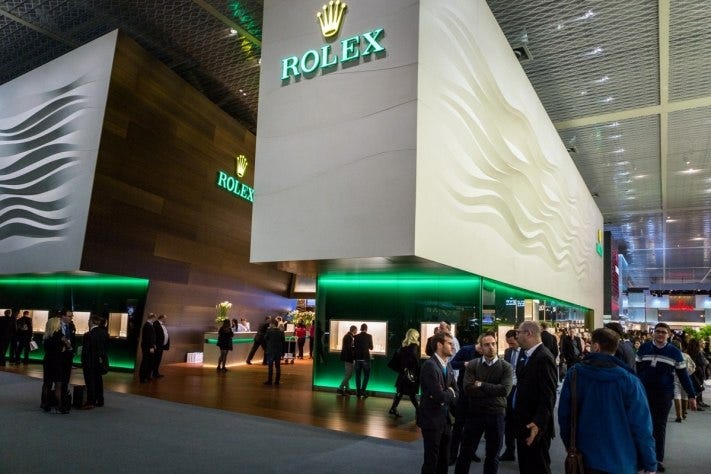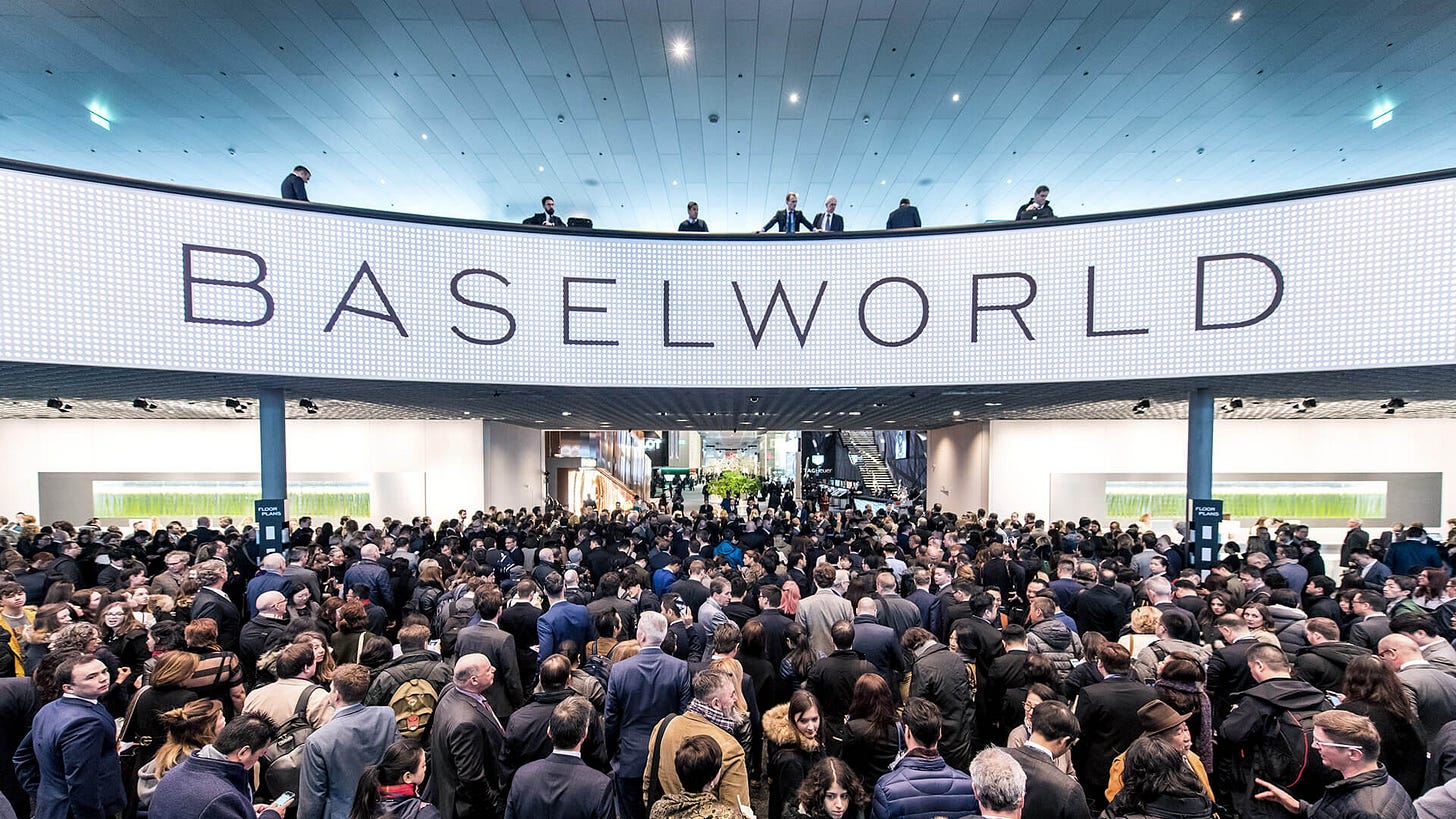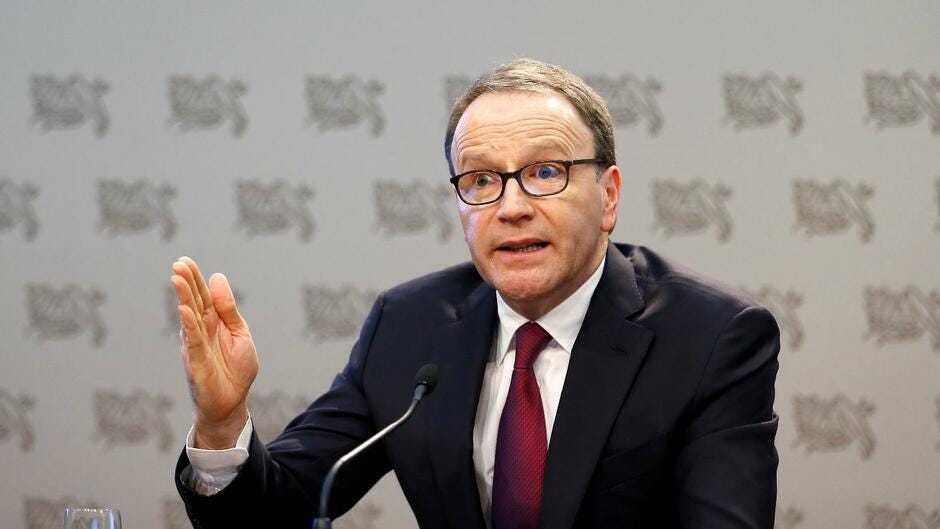Dear Insider,
Earnings season has come and (mostly) gone in Switzerland by now. As in most countries, it was closely “watched” on all sides.
Profits and revenues on some fronts surprised analysts; in other areas, losses and stagnation were to be expected. Large multinationals, both in Switzerland and the US (lead by the famous FAMA - Facebook, Amazon, Microsoft and Apple) beat expectations. Retailers even managed to hold the line, thanks to online shopping…and less spending on travel and eating out.
But what should we really watch?
Well, watches for one thing… 😁
The Swiss luxury watch industry is at a crossroads. Cancellations of the largest trade fairs (Baselworld and company) have forced some hard questions. The major brands are still strong…but it may be a few newcomers to the industry that we should keep an eye on… 👀
Too bad, so sad
All eyes were on Paradeplatz this week as well.
It was the last go-around for Credit Suisse Chairman Urs Rohner at last week’s General Assembly of shareholders and it was sad. The outgoing exec showed uncharacteristic humility and repentence in apologising for the latest (and not only) scandals (Archegos and Greensil…among others 😬) to rock the bank.
“The inexcusable losses that we have had to inform you about in recent weeks have cast a shadow,” Rohner said.
“We’ve disappointed not just our clients but also our shareholders, and not for the first time unfortunately. I offer my apologies for this.”
Perhaps the strategy of circling the wagons, “keeping calm and carrying on” - and most of all declaring oneself to have a “white vest” did not prove effective. It certainly did not protect chair of the CS risk committee Andreas Gottschling, who was forced to step down after shareholder rumblings.
Investment bankers - in Switzerland and beyond - may now (slowly) begin to turn away from the “better to ask forgiveness than permission” modus operandi.
Better late than never.
The Feature - The Swiss Watch Industry at a Crossroads
It would be unfair to say that the Swiss economy revolves around the watch industry. Many powerful brands - from Nestlé to Roche to ABB to UBS - dominate the world in their respective verticles. But…Swiss watches are special. They also encapsulate many elements of Swiss business - in a very small package:
Precision
Quality
Luxury
Exclusivity
And how is it going in the year(s) of covid-19? The answer is complex…
The 7th edition of Deloitte’s study of the Swiss watch industry shows several trends:
More re-selling: Pre-owned watches are definitely a surging sector…especially over digital channels.
Geo-political influence: Tensions with China, Hong Kong and other Asian countries can inhibit both export and potential tourist buyers in Switzerland
Omnichannel marketing: Over 60% of watch executives surveyed indicated that they are focusing on a multi-channel approach to watch selling.
The major hit from pandemic-induced travel limits and lockdowns for retail shops- with all their implications - also forced some changes. Patek Philippe announced in April 2020 that it was allowing dealers to sell their existing stock via online channels. Omega pushed its e-commerce shop to Europe as a whole.
Another interesting trend to note - for better or for worse - is the relative decline in the sales of entry-level quartz watches…more than 10 million units lower than in 2011.
With digital marketing making it possible to push higher-end watches under the nose of even the most middle-class consumer, perhaps the luxury segment will actually do better than expected?
⌚︎ Fair or No(t) Fair?
The world-famous Baselworld watch fair is on the rocks. In its place, a large number of major Swiss brands came together last month for the Watches and Wonders digital show in Geneva Industry leaders Rolex, Patek Philippe and Cartier were among the participants. Meanwhile, Swatch Group, Breitling and Audemars Piguet stayed away.
While they may be missing the “look and feel” of great shows of the past, digital events have a far larger reach - and are infinitely more cost-effective. Swatch says it has saved USD 50 million by dropping out of Baselworld in 2018.
And striking out completely alone affords more control and less competition - with little drop-off in attendance. Breitling’s own online presentation reached an audience of over 4 million.
“If you do a digital summit extremely well, it’s a couple of hundred thousand Swiss francs and you reach out to millions of people in a way you cannot during a fair,” says Georges Kern, CEO of Breitling
Not everyone is convinced, however…
“The digital format is not very efficient because there’s no face-to-face,” says Christoph Grainger-Herr, CEO of IWC. “This is why we should have a physical fair.”
⭐️ Rising stars
The faces behind the Swiss watch industry tend to be discreet. But some names are starting to be noticed… ‼️
Chabi Nouri (Piaget) - after 4 years, Chabi Nouri is starting to put her distinct mark on Piaget and prove that even in a male-dominated industry, female voices are important.
Christoph Grainger-Herr (IWC) - after rising through the ranks at a relatively young age, Christoph Grainter-Herr is aiming to keep IWC relevant in a new and changing world of watches. His 29k+ Instagram followers will help…
Frédéric Arnault (Tag Heuer) - It helps to have Bernhard Arnault, the emporer of the LVMH kingdom, as your father. But even with a famous family, the challenge of bringing Tag Heuer into the lead as a top luxury smartwatch maker provides enough opportunity for Frédéric to shine.
By the Numbers
Numbers that matter…
2 billion
Sometimes close connections can be a problem. Generali Switzerland, the Swiss daughter company of the Italian insurance giant, knows this first hand. In order to shore up reserves, it will have to chip in an additional CHF 2 billion. Are the days of unfettered profits soon to be numbered?
180
With stores and shops of all kinds shut down due to covid-19 over the past year, the subject of commercial property rents has taken on a new significance. As it turns out, rental rates can vary quite significantly: fitness studios, for instance, pay an average of CHF 180 per square meter. Luxury watch and jewelry boutiques pay quite a bit more - up to CHF 1000 for the same space. Equality seems to be at a premium.
1.7 billion
The Credit Suisse saga continues. After massive losses due to prime brokerage miscalculations, the Swiss bank announced this week that it would need to raise an additional 1.7 billion Swiss francs from existing investors. All of this after CEO Thomas Gottstein promised a “clean slate” at the beginning of the year. Clean slates obviously need to be full of money.
Feeling smarter (already)? 😀
Share this episode!
The Briefing
Burning news from around Switzerland - bit by bit…
Flying high - despite the shutdown
Out of over 150 companies in Switzerland which were included in Randstad’s 8th survey of “Ideal Employers” - the clear favorite this year was Zürich Airport. Strange, it would seem in the year that most flights were grounded and tourist travel came to a halt. One explanation can perhaps be found in another trend - luxury watch makers such as Rolex and Patek Philippe also scored extremely well. Clearly brand value trumps all - both when it comes to purchasing goods and services and when choosing an employer.
Winners and losers
Earnings season for Q1 2021 has come - and now gone. The numbers reported by major Swiss companies were mostly positive, although several left something to be desired. Global giant Nestlé managed growth of 1,3% with a 2020 profit of CHF 21,1 billion. Meanwhile, chocolate giant Lindt & Sprüngli saw its revenues drop by 6,1% in 2020 with profits down over 35% at CHF 320 million.
FINMA takes on Credit Suisse
Even as Credit Suisse reaches out for more money to its investors, Swiss regulators are coming to tea. FINMA announced this week that it was a launching an enforcement investigation into the bank with the goal of determining if Credit Suisse’s risk management personnel and processes failed to live up to standards during the recent Greensila and Archegos scandals.
Nestlé on a roll
What’s in a name? Depends on who you ask… Swiss giant Nestlé’s latest M&A acquisition has an appropriate name: The Bountiful Company. As the numbers show (see Winners and Losers above), Nestlé can certainly see itself as a ‘bountilful’ enterprise. The latest North American acquisition (to the tune of USD 5,75 billion) will make the renowned coffee-maker a leader in vitamins, minerals and health products.









